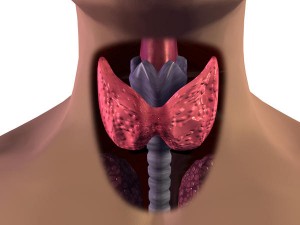There is nothing worse than not knowing why you suffer from various health issues. There are so many potential answers as to why you lack energy or can’t sleep, etc, but here is just one you must consider: you have thyroid problems. The good news is, you’ll soon learn how to boost thyroid function and should discover at least one hypothyroidism natural treatment that will work for you. Hypothyroidism is a condition where the thyroid gland lacks in producing the thyroid hormone. Don’t skip this, as it just could be the solution you’ve been searching for.
Your thyroid is a major part of your endocrine system. It and the hormones it produces are responsible for everything from a healthy weight to sexual function. When something is out of whack with your thyroid, you can experience a whole host of problems.
When the thyroid is in overdrive, functioning on high and producing too many of its crucial hormones, the result is hyperthyroidism. But when it’s not doing its job, and not producing enough thyroid hormones, you are said to have hypothyroidism. Fortunately, there are natural solutions for balancing your thyroid function.
Some Signs of Hypothyroidism
As with any other health problem, it’s possible that you show only a few signs of having thyroid issues and hypothyroidism. Further, the signs could be tied to another health ailment. Nevertheless, here are some signs of hypothyroidism.
- Weakness
- Sleeplessness, slow to rise
- Low sex drive
- Increased sensitivity to cold
- Low energy levels
- Inability to lose weight
- Aches and pains in your joints
- Poor hair and nail quality
- Premature graying or balding
- Constipation or hard stools
- Feelings of sadness
- Heart palpitations
Hypothyroidism Natural Treatment – 7 Natural Solutions
1. Adopt a Healthful Diet, Avoid Processed Wheat
As with the health of any body part, thyroid health is dependent on good overall health. So stick with whole, natural, and organic foods. Steer clear of processed foods, especially highly processed wheat (as in traditional breads and baked goods). This is because gluten can have undesirable effects on the thyroid, and this is especially true if you suffer from Hashimoto’s thyroiditis – a primary cause of hypothyroidism. About 30% of the people with Hashimoto’s thyroiditis have an unrecognized autoimmune reaction to gluten.
If you can’t go without bread, there are numerous good recipes out there that use things like rice and coconut flour instead of wheat.
2. Avoid Soy
Also, forgo soy. Soy products, particularly when eaten in large amounts, may have hormone disrupting effects. Soy is also high in isoflavones (or goitrogens), which can damage your thyroid gland. Because the thyroid is such a major part of hormonal balance and production, staying away from soy can help your thyroid production normalize.
3. Iodine
Iodine is a very popular hypothyroidism natural treatment, with many traditional and natural health experts alike recommending a good source of iodine. While nascent iodine is most often recommended, Lugol’s brand is a fine alternative. Dr. Group’s iodine supplement, Detoxadine, is also a viable option. Vitamins C and E, D3, selenium and zinc, and omega-3s should be supplemented with your choice of iodine as well.
Some food sources of iodine include:
- Seaweed and sea vegetables
- Some yogurts (organic yogurt, Greek)
- Cranberries
- Strawberries
- Dairy products
Note: Many hypothyroidism cases are actually caused by Hashimoto’s thyroiditis. It was found in some research that increasing iodine intake could actually cause your thyroid issues to worsen if you have Hashimoto’s. Instead, reducing iodine intake may be the solution.
4. Consume More Antioxidant-Rich Foods
Antioxidants are also important in keeping your thyroid healthy. But rather than getting them from traditional multivitamins, that simply exit the body just as easily as they entered, obtain them from natural food sources. Load up on vitamin C from dark green vegetables and citrus fruits, Omega 3 fats from walnuts and flax seeds, and zinc from pumpkin seeds.
Here are 5 antioxidant-rich foods to get you started.
5. Reduce Exposure to the Chemical PFOA (Found in Non-Stick Cookware)
Finally, reduce your exposure to PFOA, found in common household products including nonstick cookware and waterproof fabrics. Researchers have found that people with higher levels of PFOA (perfluorooctanoic acid) have a higher incidence of thyroid disease.
6. Coconut Oil
Coconut oil has been used as just one hypothyroidism natural treatment passed on from person to person, and is one of the best foods you can eat for your thyroid. In addition to being made up of medium chain fatty acids known as medium chain triglicerides (MCTs), which help with metabolism and weight loss, coconut oil can also raid basal body temperatures – all good news for people suffering from low thyroid function.
Here is just one experience someone had on EarthClinic:
If you are feeling exhausted…. Coconut Oil & Iodine is AMAZING! I am 39 and mom of two. I have been feeling mildly flu-like for months not to mention beyond lethargic… I went to a naturalpath who did some kinseology tests and said it was my thyroid. He gave me some liquid iodine derived from dulse(seaweed). I then started taking coconut oil topically and internally. … In ONE WEEK, and I am not exagerating, I feel 85 to 90% better. My brain fog is gone. Even when i am not able to get a lot of sleep I don’t feel that heavy tired anymore!!!!
7. Natural Hormone Balancing
One approach to fixing thyroid issues and hypothyroidism is the use of hormone therapy. Most often, synthetic hormones like Synthroid, Levoxyl, or Levothroid are used, which contain only the T4 hormone and no T3 – two hormones produced by the thyroid gland. Instead of turning to these synthetic hormones, it is recommended to try a ‘natural’ hormone balancing treatment. Armour Thyroid is one treatment that some recommend if you’re going to go the hormone therapy route. But be sure to do further research before making any decisions, and consider trying other solutions or supplements beforehand.
Thyroid conditions can be serious. You may need to see a doctor for some additional insight, but be very wary of the medications they suggest. Let them know you prefer natural solutions, or see a naturopath first whenever possible. Be sure to pass on which hypothyroidism natural treatment works for you.
Additional Sources:







